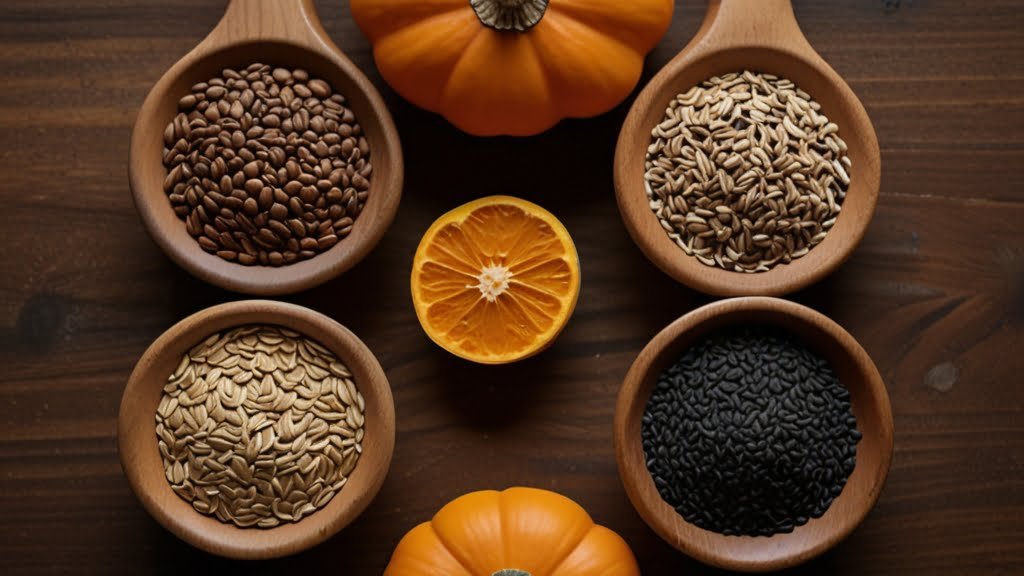Healthiest Seeds – Seeds offer a wide range of nutrition, including healthy fats, protein and vitamins and minerals. They can be easily incorporated into any diet.
Sprinkle chia seeds over oatmeal or yogurt, stir them into smoothies and tahini dressings or add roasted pumpkin seeds to salads and roasted veggies. These seeds are a great source of Omega-3 fats, ALA (alpha linolenic acid), phosphorus and magnesium.
Flax Seed
Flax seeds (also called linseeds) are packed with a mix of fiber, protein and omega-3 fatty acids. A 2-tablespoon serving contains 4 grams of fiber and 2.5 grams of protein, plus 6 grams of healthy omega-3 fats—alpha-linolenic acid and lignans. Omega-3 fatty acids are essential for heart health and reduce the risk of certain cancers. Additionally, consuming a small amount of flax seeds helps increase your intake of fiber, which is known to improve digestive health, decrease constipation and diversify the gut microbiome.
The lignans in flax seeds are phytoestrogens, which act as a mild estrogen in the body and may help decrease the risk of breast cancer for women. In addition, some studies have found that eating flax seeds may reduce blood pressure.
Aside from supplying a variety of nutrients, the majority of seeds are rich in dietary fiber. This nutrient adds bulk to the stool to promote regularity and prevent issues like hemorrhoids, diverticulitis, constipation, and even intestinal ulcers. In addition, dietary fiber feeds the good bacteria in your gut and can improve immune function, mental health, nutrient absorption and more.
Whether you sprinkle roasted pumpkin seeds over your yogurt or smoothie, blend chia seeds into your breakfast or mix in some ground flax seed into your favorite bread recipe, adding a small handful of seeds to any meal is an easy and impactful way to boost the nutrition of any food.
Chia Seed – Healthiest Seeds
Like flax seeds, chia seed are high in fiber and omega-3 fats (specifically alpha-linolenic acid, or ALA). These tiny seeds are known for their ability to expand when mixed with water to form a gel, making them a great ingredient to add thickness and nutritional value to plant-based recipes. They’re also widely used as an egg substitute in pudding and other foods.
Chia seeds are a good source of protein, which is necessary for building and maintaining muscle mass. They also contain the bone-building nutrients magnesium and phosphorus, as well as calcium (gram for gram, chia seeds contain more calcium than dairy products).
Seeds are an excellent source of healthy fats and fiber, which promote heart health and weight loss. Fiber moves through the digestive tract slowly to help you feel full and reduce your appetite, while protein decreases levels of the hunger hormone ghrelin. A 2017 study found that people who eat a diet high in seeds are less likely to gain weight than those who eat fewer seeds.
While all seeds are nutritious, they’re especially important for vegetarians and vegans. Vegetarians and vegans are at risk of nutrient deficiencies because they don’t eat animal products, which provide all nine essential amino acids. Seeds, such as flax and chia seeds, are a good source of complete proteins, meaning they contain all the amino acids needed for human health.
Hemp Seed – Healthiest Seeds

Hemp seeds (also known as hemp hearts) are high in protein and a good source of Omega-3 fatty acids, potassium and magnesium. They also contain an antioxidant called lignans, which may protect against cancer.
Seed-rich diets are high in dietary fiber, which promotes digestive health by adding bulk to stool and reducing sugar cravings. They also provide important micronutrients, including manganese and vitamin E.
A diet rich in nutrient-dense seeds like flax, chia, pumpkin and hemp seeds may reduce the risk of heart disease by improving blood cholesterol levels, lowering blood pressure and triglycerides, and supporting healthy weight management. The healthy fats found in seeds may also help lower inflammation, promote brain health and improve the skin’s appearance.
Hemp seeds and oil are an excellent source of plant-based protein, which is considered a “complete” protein because it contains all essential amino acids. This may help promote muscle growth and improve recovery after exercise. They are also a good source of the omega-3 fatty acid alpha-linolenic acid, which may reduce inflammation and protect against heart disease.
The gamma-linolenic acid in hemp seeds can help alleviate the symptoms of premenstrual syndrome, such as breast tenderness and water retention by producing prostaglandin E1. The gamma-linolenic fatty acid in hemp seeds also helps ease menopause symptoms, including relief from hot flashes and mood swings.
Pumpkin Seed
Pumpkin seeds (also known as pepitas) are a nutrition powerhouse that can be added to a variety of meals to add crunch, texture and health benefits. They are low in carbohydrates (about 3 grams per serving, unless they are flavored) and most of those carbs are dietary fiber that helps support a healthy gut. Pumpkin seeds are also packed with iron, zinc, magnesium and protein. They are a great source of immune-supporting vitamin E and contain a good amount of plant phenols.
The omega-3 fatty acids in pumpkin seeds help to lower cholesterol levels, while their magnesium content can help to regulate blood pressure. They also have a high level of tryptophan, which is converted into serotonin, a sleep-promoting neurochemical. This combined with the muscles-relaxing effects of magnesium can lead to improved sleep quality, especially in men.
Studies show that eating a diet rich in nuts and seeds may help to prevent heart disease, diabetes and some cancers. They are also a great source of plant phenols, which have powerful antioxidant properties and can help to slow the growth of certain cancers.
The dietary fibre in seeds may also reduce the risk of bowel cancer. The seeds’ fatty acid contents can also improve lipid profiles, and they are a good source of vitamin A. Pumpkin seed oil has been shown to reduce the symptoms of benign prostatic hyperplasia, a condition that causes difficulty urinating.


